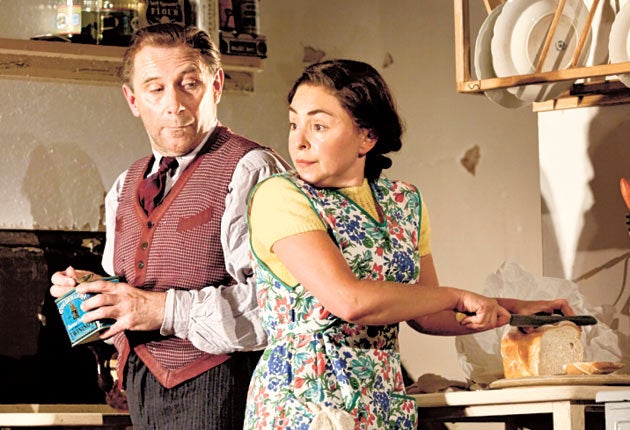Chicken Soup with Barley, Royal Court, London

Your support helps us to tell the story
From reproductive rights to climate change to Big Tech, The Independent is on the ground when the story is developing. Whether it's investigating the financials of Elon Musk's pro-Trump PAC or producing our latest documentary, 'The A Word', which shines a light on the American women fighting for reproductive rights, we know how important it is to parse out the facts from the messaging.
At such a critical moment in US history, we need reporters on the ground. Your donation allows us to keep sending journalists to speak to both sides of the story.
The Independent is trusted by Americans across the entire political spectrum. And unlike many other quality news outlets, we choose not to lock Americans out of our reporting and analysis with paywalls. We believe quality journalism should be available to everyone, paid for by those who can afford it.
Your support makes all the difference.In a year when we are honouring the centenaries of Terence Rattigan and Tennesee Williams, it is good that the Royal Court and the National Theatre are stealing a march on 2012 when Arnold Wesker will celebrate his 80th birthday. This August sees a major revival in the Olivier of his 1959 play, The Kitchen. First off, though, there's Dominic Cooke's electric and intensely touching revival of Chicken Soup with Barley, Wesker's 1958 drama that has the distinction of being one of the very few plays in English that offers an empathetic treatment of a communist family. We follow the Jewish Kahn clan in scenes that offer snapshots of the intertwined disintegration of an ideology and the unravelling of their human relationships.
Kenneth Tynan once said that Wesker, as a committedlyJewish writer, "thinks internationally but feels domestically" – a truth borne out by this piece in which we follow the Kahns from 1936, as they excitedly prepare to blockade Cable Street against Oswald Mosley's parading blackshirt fascists and as the daughter's boyfriend prepares to join the International Brigade in Spain. After a middle section in 1946 that shows how fighting with the masses during the Second World War has disenchanted this latter pair with the worker solidarity, the play ends a decade later, after the Soviet invasion of Hungary, with a climactic showdown between fiery, indomitable matriarch Sarah, who still clings to her communist ideals and the partly autobiographical character of the son Ronnie who returns from working in a kitchen in Paris like the disillusioned ghost of himself. Having asserted in the opening section that loyalists can't postpone love until the struggle is over, "Love comes now. You have to start with love. How can you talk about socialism otherwise?" Sarah is left having to contend that the ideal of brotherhood is a noble goal that has a right to survive even grave disappointment with actual people.
Beautifully capturing the play's moving ambivalence (if Wesker's head is with Ronnie, his heart is with Sarah), Cooke's production has a terrific vivacity. The performances are superlative. Though you might flinch from being her child, Samantha Spiro is beyond praise as Sarah, showing you a warm and indomitable life force whose heart is a big a bus. When she pleads with Ronnie "don't let me finish this life thinking I lived for nothing", I was wrestling with lump in my throat of golf ball proportion. Wonderful, too, is Danny Webb's performance as her feckless husband, Harry. Highly recommended.
To 9 July (020 7565 5000)
Join our commenting forum
Join thought-provoking conversations, follow other Independent readers and see their replies
Comments